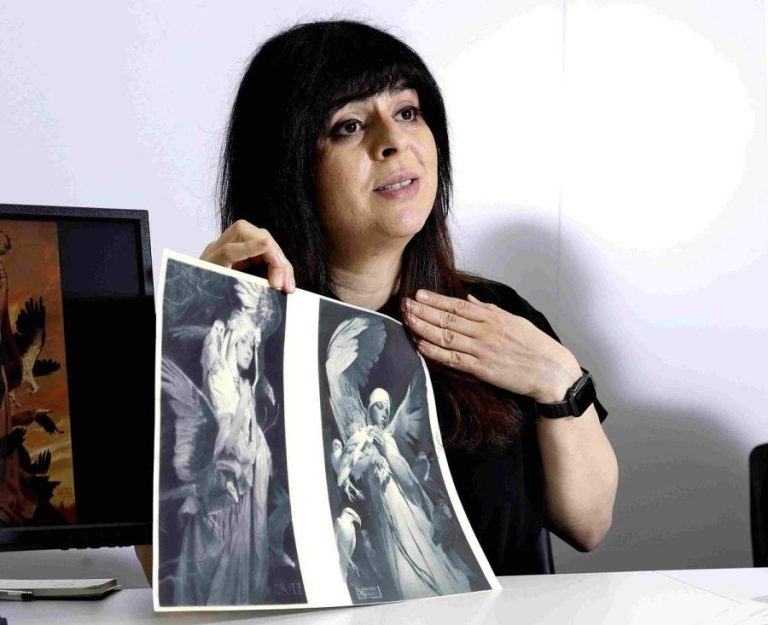February 23, 2024
Tokyo – American artist Carla Ortiz held two pictures in front of her. One was her pencil drawing from 2016 titled “The Death I Bear,” while the other similar image was “created” by image-generating AI based on her work.
“I hate it,” Ortiz told the Yomiuri Shimbun in December, saying that AI-generated work “is like a monster made of all the parts of my work.”
The 38-year-old artist filed a class action lawsuit with other artists in a US court in January 2023, claiming that their copyrights had been infringed by companies that developed generative AI software. The plaintiffs alleged that billions of images, including their artwork, were used without permission to train the AI, resulting in “copyright laundering” of the images from which software developers profited.
“We want to end the unprecedented violation of legal rights, because our jobs, careers, and creative communities have been destroyed by these companies,” Ortiz said.
“The picture of Mount Fuji that looks like it was painted by Van Gogh,” “the dancing Mickey Mouse” — just giving directions like these to generative AI will produce images based on learning huge amounts of data, including copyrighted works.
Artists and writers filed a series of lawsuits in the United States in 2023 against companies that developed such systems, claiming that their copyrighted works were used without permission to train artificial intelligence.
Such concerns have also been raised in Japan.
An animator in his 30s was designing cartoon-like characters under an outsourcing contract with an Internet-related company. However, about a year ago when generative AI began to spread in society, the company began producing AI-made illustrations of characters he created, and selling them without his permission. The company stopped providing work to the painter.
“They trampled on my motivation and pride in life,” the painter said. He added: “If this type of behavior continues unchecked, the market will collapse. Appropriate legislation is essential.”
Japan is said to be a “machine learning heaven” for generative AI, with Section 30-4 of the Copyright Act, introduced in the 2018 legal revisions, allowing AI to conduct machine learning of copyrighted works without permission.
This may not be done “if the action is unreasonably prejudicial to the interests of the copyright owner,” but only a few specific cases have been brought.
Four organizations — the Japan Newspaper Publishers and Editors Association, the Japan Magazine Publishers Association, the Japan Photographic Copyright Association, and the Japan Book Publishers Association — issued a joint statement in August calling for measures to protect rights, saying: Copyright law is very favorable for AI learning Compared to other countries.
The Japan Newspaper Publishers and Editors Association is calling for an urgent review of the copyright law.
In December, the Cultural Affairs Agency presented its draft thinking, which provided examples of situations where unauthorized learning would not be permitted. But it did not mention amending the law.
“Copyright law does not envisage a situation where generative AI produces creative works instantly, which could lead to insufficient revenue return for copyright holders,” said Professor Masahiko Kinoshita of Kobe University, who specializes in constitutional and information law. A new legal system should be considered.”
According to anime producer Masuro Ueda, who leads the Nippon Anime and Film Culture Association, “It is necessary to clarify the copyright issue if we want AI to become a ‘good partner’.”
“If creators' efforts continue to be ignored, fewer people will strive to create new things, which could lead to a decline in culture,” said Ueda, who has worked on popular anime such as “Mobile Suit Gundam” and “City Hunter.” “
The development of artificial intelligence is causing unprecedented radical transformations in creative activities. The question now is how to protect human intellectual activities.

